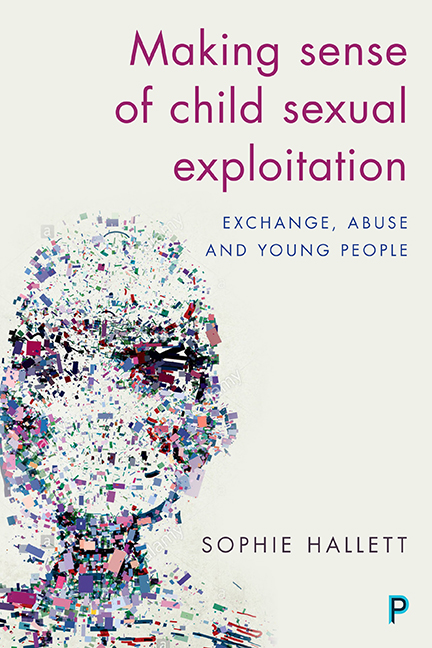Book contents
- Frontmatter
- Dedicaton
- Epigraph
- Contents
- Acknowledgements
- Introduction
- one From ‘child prostitution’ to ‘child sexual exploitation’: an overview
- two Vulnerabilities
- three Risk
- four Exchange and abuse
- five Responses, recognition and reciprocity
- Conclusion: child sexual exploitation – agency, abuse and exchange
- References
- Index
three - Risk
Published online by Cambridge University Press: 05 April 2022
- Frontmatter
- Dedicaton
- Epigraph
- Contents
- Acknowledgements
- Introduction
- one From ‘child prostitution’ to ‘child sexual exploitation’: an overview
- two Vulnerabilities
- three Risk
- four Exchange and abuse
- five Responses, recognition and reciprocity
- Conclusion: child sexual exploitation – agency, abuse and exchange
- References
- Index
Summary
Risk (noun): a situation involving exposure to danger; the possibility that something unpleasant or unwelcome will happen.
Risky (adjective): full of the possibility of danger, failure, or loss.
(Oxford English Dictionary)In this second of two chapters exploring the ways that young people and professionals made sense of how and why sexual exploitation happens, the discussion moves to a consideration of ‘risk’ and ‘risky behaviours’ in the context of those vulnerabilities previously discussed. Young people's risk to sexual exploitation is central to a contemporary framing of CSE. Alongside vulnerabilities, risk indicators are used in practice as a way of assessing a young person's likelihood of being or becoming sexually exploited; in this way they stand as a framework of sorts for understanding how it is that young people come to be sexually exploited. While theories of risk would seem to be central to a chapter made up in this way, they are not. Risk in this particular context stands to mean young people's actions and behaviours. For example, in UK government policy, ‘risk’ purports to mean ‘the things that young people do’ which indicate their likelihood of being sexual exploited, and risk indicators are defined, in essence, as young people's behaviours which can result in them being ‘exposed to situations in which they are accessible to those who wish to harm or exploit them’ (Clutton and Coles, 2007: 23). Furthermore, explanations for young people's engagement in ‘risky’ behaviours are often underpinned by attachment theory or conceptions of youth as a distinct transition phase from dependent childhood to independent adulthood; one embedded within normative western ideas of youth that carries associations of risk taking and rebellion as an expected and natural part of teenage years (see for example Foley et al, 2004). Directly implicated in this conceptualisation of risk is an understanding of young people's agency. Drawing on the concepts of childhood and youth, I consider the difficulties that the professionals displayed – and talked about themselves – in making sense of young people's agency and their risky behaviours in respect of involvement in CSE, and how this was different from the ways in which the young people made sense of (what are perceived by others as) risks and risky behaviours. I begin by considering what the young people had to say about the things they did that they reflected on as making them more directly vulnerable to sexual exploitation.
- Type
- Chapter
- Information
- Making Sense of Child Sexual ExploitationExchange, Abuse and Young People, pp. 55 - 82Publisher: Bristol University PressPrint publication year: 2017



